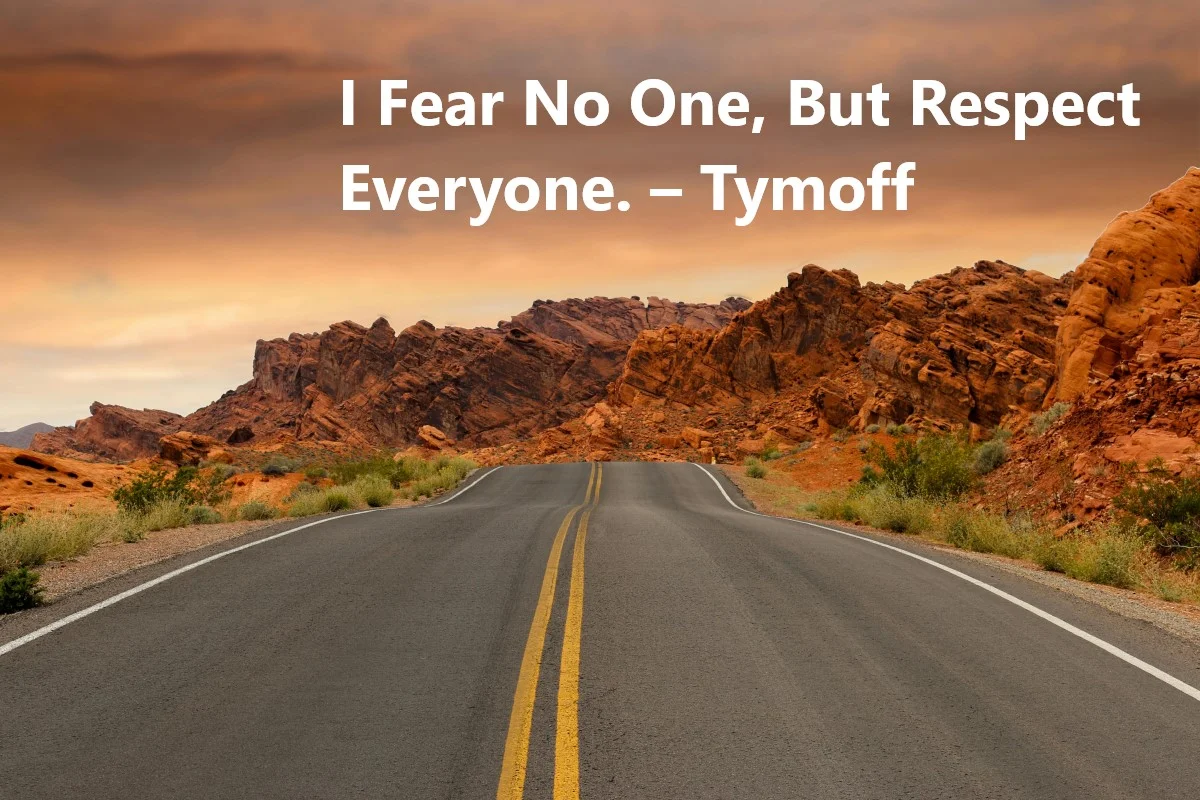i fear no one, but respect everyone. – tymoff? In a world driven by competition, ambition, and survival, few phrases capture the essence of balanced strength and humility as well as “I fear no one, but respect everyone.” This statement, attributed to Tymoff, speaks volumes about a mindset that intertwines confidence with reverence, individual strength with collective respect. This article explores the depth behind this philosophy, unpacking its relevance in today’s social landscape, and offering insights into how this attitude can shape personal growth, relationships, and even societal harmony.
Understanding the Essence of the Quote
At first glance, “I fear no one, but respect everyone” seems like a simple statement. However, when we break it down, it reveals profound wisdom. The quote combines two contrasting yet complementary ideas: fearlessness and respect. The first half, “I fear no one,” speaks to inner strength, self-confidence, and courage. It suggests a person who is not easily intimidated, one who possesses the inner resolve to face challenges without succumbing to fear.
The second half, “but respect everyone,” introduces an essential balancing factor—humility and respect. Here, Tymoff emphasizes that while one should be courageous and unwavering, respect for others remains a cornerstone. Respect is not just for those deemed superior, but for everyone, regardless of status, power, or background.
This philosophy offers a nuanced approach to life—one that encourages people to be brave, assertive, and self-assured, yet also grounded in humility, kindness, and empathy.
The Value of Fearlessness
Fear is one of the most powerful emotions that can dictate human behavior. It can limit our potential, stunt our growth, and prevent us from pursuing our goals. By declaring “I fear no one,” Tymoff encourages a mindset that is free from the shackles of fear. This does not mean reckless bravado, but rather a deep sense of self-assuredness and inner calm. True fearlessness is not about denying fear altogether, but rather confronting it and moving forward despite it.
Fearlessness can lead to numerous positive outcomes in life. It allows individuals to take risks, venture into unknown territories, and embrace challenges that others may shy away from. Whether it is in the realm of career, relationships, or personal growth, a fearless attitude opens doors to possibilities that would otherwise remain closed.
However, fearlessness should not be confused with arrogance or a sense of superiority. The absence of fear should not translate into the absence of respect for others. This is where the second half of the quote comes into play.
The Power of Respect
Respect is a fundamental value in any society. It is the glue that holds relationships, communities, and civilizations together. Respecting others involves acknowledging their inherent dignity and worth. It goes beyond mere politeness or social niceties; it is about recognizing the humanity in every person, irrespective of their differences.
In a world increasingly divided by race, religion, politics, and socio-economic status, respect is more crucial than ever. It promotes dialogue over conflict, understanding over judgment, and unity over division. When you respect others, you open yourself up to learning from them, understanding their perspectives, and finding common ground.
Respect does not require agreement or blind submission. It is entirely possible to disagree with someone while still maintaining respect for their right to hold a different opinion. This balance between standing firm in your beliefs while showing deference to others is the crux of the quote.
Why Balance Is Essential
The duality in Tymoff’s quote—fearlessness paired with respect—is a powerful reminder of the importance of balance in life. Extreme confidence without respect can lead to narcissism, while excessive humility can turn into self-doubt. The quote encourages us to find a middle path where strength is tempered by empathy, and courage is guided by consideration.
This balanced mindset is especially relevant in leadership, where both qualities are crucial. A good leader must be confident enough to make tough decisions and face challenges head-on, but also humble enough to listen to others, value diverse perspectives, and treat everyone with dignity. Fearless leaders who respect their team members foster a culture of trust and collaboration, leading to better outcomes.
Applications in Personal and Professional Life
Let’s explore how this principle applies in various areas of life:
1. Personal Growth and Self-Confidence
The journey of self-development often requires shedding limiting beliefs and embracing your true potential. Fear is a major roadblock on this path. By adopting a fearless attitude, you give yourself permission to grow, to try and fail, and to learn without the burden of constant self-doubt. Yet, growth should always be accompanied by respect—respect for your own process, respect for those who guide and challenge you, and respect for others walking their own path.
2. Relationships and Social Interactions
Healthy relationships are built on mutual respect. Whether it’s with family, friends, or colleagues, respecting each other’s boundaries, opinions, and individuality is key to maintaining harmony. Fearlessness in relationships means being open, honest, and clear in your communication. It means addressing conflicts directly and standing up for what is right. But it also means respecting differences and valuing the other person’s perspective, even when it contradicts your own.
3. Workplace Dynamics and Leadership
In the professional sphere, this philosophy can transform how you approach work and collaboration. A fearless mindset empowers you to take initiative, voice your ideas, and push for innovation. On the other hand, respect ensures that your confidence does not turn into domination or disrespect for colleagues. In leadership roles, balancing fearlessness with respect leads to a culture where employees feel valued, heard, and motivated.
4. Facing Adversity and Challenges
Life is filled with challenges—whether personal setbacks, professional obstacles, or societal injustices. Facing these difficulties with courage is vital. Fear can paralyze you, leading to missed opportunities or failure to act in critical moments. However, courage should never be accompanied by disrespect or a dismissive attitude toward others. Even when fighting for a cause or defending your beliefs, maintaining respect ensures that your actions are guided by integrity.
Respect and Fearlessness in a Globalized World
In today’s interconnected world, where cultures, ideologies, and values collide, this balance of fearlessness and respect is more pertinent than ever. Globalization has brought us closer, yet it has also highlighted our differences. In such an environment, being fearless allows us to stand by our values and beliefs without feeling threatened by those who are different. At the same time, respecting others paves the way for peaceful coexistence and collaboration.
Imagine a world where fear and mistrust are replaced with confidence and mutual respect. Diplomatic negotiations, international collaborations, and cultural exchanges would flourish under such conditions. By embodying this principle, individuals and nations alike can work toward building a more harmonious and progressive global society.
The Dangers of Misinterpreting the Quote
While the message behind Tymoff’s words is powerful, it’s important to avoid misinterpretation. Some may mistakenly equate fearlessness with a lack of caution or respect with blind submission. The quote is not advocating for arrogance disguised as confidence or weakness masked as politeness. True fearlessness is a calm, grounded assurance, not reckless bravado. Likewise, genuine respect stems from understanding and empathy, not superficial deference.
In a time when social media amplifies voices—often in divisive ways—practicing both fearlessness and respect can lead to more meaningful conversations. It’s easy to hide behind anonymity and lash out without fear of consequences. But the real strength lies in engaging in discussions where you stand firm in your beliefs while also respecting differing opinions.
Cultivating This Mindset
Adopting this mindset requires continuous practice and self-awareness. Here are some steps to help cultivate fearlessness balanced with respect:
- Build Self-Confidence: Work on recognizing your strengths and embracing your uniqueness. Confidence grows from knowing who you are and what you stand for.
- Face Your Fears: Identify the fears holding you back and confront them one by one. Start small and gradually build the courage to tackle larger challenges.
- Practice Empathy: Make an effort to see things from others’ perspectives. This builds respect and reduces the tendency to judge or dismiss differing viewpoints.
- Engage in Constructive Dialogue: Whether in person or online, approach discussions with an open mind. Stand firm in your beliefs, but be willing to listen and learn.
- Reflect on Your Interactions: After encounters with others, reflect on whether you balanced confidence with respect. Were you assertive yet considerate?
- Set Healthy Boundaries: Respect includes setting and honoring boundaries—both yours and others’. This fosters healthy relationships built on mutual understanding.
- Stay Grounded: Remember that true fearlessness is not about never feeling afraid, but about taking action despite fear. Ground your confidence in humility and integrity.
Conclusion: A Philosophy for Modern Life
“I fear no one, but respect everyone” is more than just a catchy phrase; it’s a life philosophy that combines strength with humility, assertiveness with kindness, and courage with empathy. In a world filled with competition, judgment, and divisiveness, this mindset offers a path toward more harmonious living—both within ourselves and in our interactions with others.
As we navigate the complexities of modern life, let’s remember that fearlessness and respect are not mutually exclusive. In fact, they are complementary forces that, when balanced, can lead to personal growth, stronger relationships, and a more compassionate society. By embracing both, we can become individuals who are confident without being arrogant, strong without being overbearing, and principled without being dismissive.
In the end, those who live by this principle are not only more likely to achieve success

